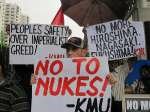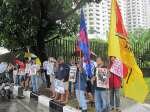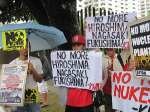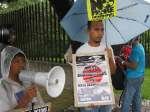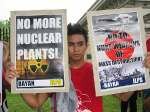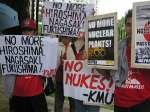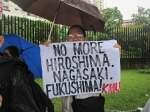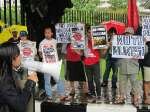April 15, 2012
Around 200 protesters, composed mainly of Filipino and Indonesian domestic workers, staged today, April 15, a rally in front of the United Centre Building, where the Philippine Consulate General is situated, to condemn the planned re-entry of US military forces into Philippine soil.
Led by the International League of Peoples’ Struggle Hong Kong and BAYAN-HK, the said mass action was part of the internationally-coordinated action against the re-installation of US military troops in the Philippines.
Norman Uy Carnay, coordinator for BAYAN-HK, opened the program by stating the grave violation that the US military presence and exercise will have on the national sovereignty of the Filipino people. US imperialism, he stated, only aims to further strengthen its political, economic and military influence and stronghold in Asia Pacific and to contain China and North Korea.
For many years, he said, US military forces have only caused more harm than good to the people in countries where their bases are present, i.e. South Korea, Japan, the Philippines. He also scored the Philippine government for continually rekindling the military ties with the US government despite the victory of the Filipino people in closing down and kicking the US military bases out the Philippines in 1991.
Ganika Diristiani, chairperson of Asosiasi Tenaga Kerja Indonesia di Hong Kong (ATKI-HK), expressed solidarity with the Filipino migrant workers and their families. In her speech, Ganika stated that Indonesia too is not spared from the US military intervention. The Indonesian government, she said, is allowing US military forces to come in to Indonesian grounds and hold joint military exercises.
She highlighted the fact that even the 1965 massacre of many protesters and activists in Indonesia was an attempt of the US and Indonesia governments to wipe out the national liberation movement in the country.
Dolores Balladares Pelaez, chairperson of the United Filipinos in Hong Kong, highlighted the active and steadfast involvement of Filipino migrant workers in Hong Kong in the campaign against US military intervention in the Philippines.
Filipino migrant workers, she said, are aware of the many crimes that the US military forces have committed against the Filipino women and people. She said that the US military troops have only put the lives of people in danger and that the Philippine government is a mere puppet to the US government and allowing this to happen.
Other groups present in the action were the various members of the Asian Migrants Coordinating Body like the Overseas Nepalese Workers Union, Far East Overseas Nepalese Association and Thai Regional Alliance. Other groups like the Asia Pacific Mission for Migrants, the International Migrants Alliance and the Anonymous A8 were also present.
Another protest action at the US Consulate General is scheduled noon tomorrow, April 16.
(Below is the joint statement of ILPS-HK and BAYAN-HK.)
Stand against US troops in the Philippines and in the Asia-Pacific
Resist US military control and expansion
15 April 2012
The International League of People’s Struggle (ILPS) – Hong Kong and Macau chapter and the Bagong Alyansang Makabayan (BAYAN, New Patriotic Alliance) – Hong Kong are one with the people in the Philippines in opposing the newest of the PH-US joint military exercises and the agenda of increased military presence in the country.
On April 16, about 4,000 US troops are poised to come to the Philippines for the “Balikatan” under the Visiting Forces Agreement (VFA) that seeks to transform the whole country into a US military outpost. Once again, the Philippine government shows how it panders to US interests in the Philippines and in the region.
The continued control of the US to the Philippines is most concretely exhibited in US’ military control in the country. Though 20 years ago the strong anti-US Bases movement pushed the US out of its former bases, the US never loosened its stranglehold of the Philippine military through continuous military aids, supply of arms and since 1998, the so-called joint military exercises.
Recent news also shows that the US is pushing for the retaking of its former bases and an increase of troop deployment in the Philippines. It is fanning the Spratlys stand-off with China – and even scaremonger on the launching of a weather satellite by North Korea – to justify its presence in the Philippines.
The moves to have a stronger military presence in the Philippines have a two-fold agenda: first is to ensure that the country remains under the US’ grips and secondly, as part of the military agenda of the US in Asia Pacific and the Middle East to contain China and the Democratic People’s Republic of Korea.
The PH-US joint military exercises are obviously aimed at strengthening the Philippine military campaign against Moro Islamic Liberation Front (MILF) in the south and the revolution being waged by the CPP-NPA-NDF. In the past, there have been confirmed reports of US troops participating in actual combat operation against the MILF and the New People’s Army.
Maintaining military control is integral to the economic and socio-political hold of the US over the Philippines – the control that has reduced the country into a puppet of the US, where poverty is rampant and the people are forced to modern-day slavery overseas just to survive.
Control of the Philippines, meanwhile, is crucial protecting and increasing US interest in the region.
Balikatan in the Philippines is just part of the larger scheme of redeployment of US troops in countries in the region – Japan, Australia, South Korea and Philippines – that are best suited as springboards for politico-military actions. In the light of the crisis still besieging US, the US is scrambling to remain control over resources in Asia-Pacific and the Middle East through military posturing – even direct aggression – and a wider implementation of neoliberal globalization policies as shown in its pushing of the Trans Pacific Partnership Agreement (TPPA) that’ll consolidate its control of resources even to the Caribbean nations.
Aside from the economic and political impacts, countries that have suffered under the hands of US military presence have shown how even the cultural and social landscapes of these countries are exploited and even destroyed. It is now shown in the plan to build a US base in Jeju island in South Korea that is considered a historical site, as well as the promotion of sex tourism among US Marines, and the violence perpetrated against Filipino, Japanese and Korean women.
In countries of the region where the US is forcing its military presence, people’s organizations are gearing up for an intensified resistance. Networking and cooperation are being conducted among groups in the Asia-Pacific region and the Middle East to confront US intrusion and resist the presence of US military personnel and installations.
In Hong Kong and Macau, members of ILPS and BAYAN shall continue to launch actions and gather support until US troops are removed from the Philippines and in the region; and until US imperialism is defeated in Asia-Pacific and in the world.#
